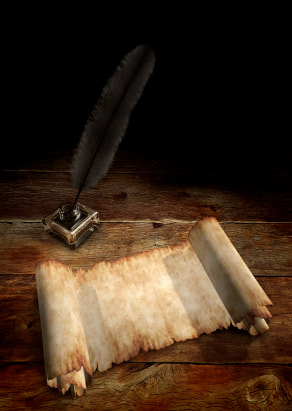 An observation from my writing desk while perusing writing forums on the Internet… It seems to me that many writers are engaged with a full measure of devotion to the “entitlement program”. Many feel that their work is so stupendous that a publisher should not only “discover” them and their book, but also court them and offer to publish their writing with absolutely no author investment or participation in the risks. It’s a little disconcerting. Remember, the definition of a publisher is any person who decides that a book is likely to be profitable, finances its printing, distributes it, and takes the risk of a loss if it does not sell, or the profit if it does. What many people don’t realize is that Benjamin Franklin, often revered as the father of American Publishing, did it all on his own. He worked hard to create his writings… long nights with pen and ink by candlelight after his regular workday was done. He spent his own, hard-earned money to buy the paper and ink for the press, and added his own sweat equity into the process, tugging at the machinery to get the pages bound. In the end, he reaped the rewards of his creative labor. Franklin didn’t submit his writings to some publishing house in New York, Quebec, Great Britain, or Australia, waiting to be “picked up”. He just went out and did it. He was the first self-published author in America. So often I hear from writers at various festivals or conferences, or read on blogs and in writing forums, “You should NEVER pay to have your work published!” That statement is usually followed by a highly volatile lecture about why self-publishing is the devil’s tool; and how, if you want to be respected as an author, you should NEVER self-publish! When did we, as a writing community, become so full of ourselves that doing it ourselves, with the assistance of professional guidance and advice, is no longer respected? I wonder if Benjamin Franklin would have lived to see his work published if he had taken the same attitude? Imagine the conversation… “No, John, I’m not going to publish my book on my own, that’s a lot of work, and it will cost more than I should spend. After all, I took all that time to create it. This is damn fine writing, John; I should be paid to offer readers the privilege to enjoy my work! I’m just going to send it off to London and let them do it for me. Surely, my writing is so wonderful that once they read it, they will see how readers will clamor to buy it. I’ll make millions!” Yeah, I’m pretty sure the conversation didn’t happen that way. Here’s what I think the conversation actually sounded like: “You know, John, I spent so much time and took so much effort to create these words, that they feel sacred to me. I think I should retain control over who gets to publish them. I mean, let’s face it; England hasn’t established a great track record for helping us without bleeding our purses dry in the process. No, John, I’m going to publish it myself, my way. Sure, I’ll consider the advice of other writers in the community – to make my book the best it can be – and I’ll pay them, just as I would want to be paid for my expertise. Yes, it’ll be a lot of work, but it’ll be worth it in the end. I’ll be in control if it’s appearance and who gets to sell it, and at what price. And in the end, John, I’ll keep all the profits. This is what I deserve. After all, I’m doing the work.” Now, that’s a conversation that sounds a bit more realistic. Somewhere along the way, through all the decades that passed since the days of Benjamin Franklin, writers lost sight of this founding father’s understanding of what literature should be… writers taking the risk to put their creativity into the world and hope that readers enjoy it. Now, too many writers are so full of themselves that they can’t accept that writing is both work and risk. A writer isn’t entitled to be published. A writer isn’t entitled to the paycheck they think will be generated by their astounding words showing up on the page. Sometimes, if you want to see a dream fulfilled, you have to take the risk, invest the sweat equity, and pay to make it happen. Remember, you’re going to pay for it, regardless. If you choose to self-publish, you pay for the experience and expertise of professional guidance along the way… Information services like ISBNs and copyright registration (because the government always takes their cut if you want your work protected); editors (because we’re all smart enough to understand that we should NEVER edit our own work); interior layout designers… whether print or e-book, it’s important to get it right (yes, this is indeed a task many of us are capable of taking on ourselves, but most shouldn’t); cover designers… because, let’s face it, the cover makes the biggest impression on the reader – whether in print or e-book – it’s the first impression you have toward gaining a new reader and fan (some of us are artistic enough to do this… most of us aren’t). The point is, even before you get to promotion and sales, there are a lot of expenses involved when creating a book that readers will someday read and share with their friends. Yet, after all this investment of time and money, you will enjoy the pleasure of not having to share your royalty checks with anyone else. In the end, you will reap the greatest reward, a full share in equity and complete ownership of the creative process and the finished work. What could possibly be more fulfilling than that?! If you choose to wait until a “traditional” publisher picks up your book… you still pay for that privilege… just on the back end. First, you’ll have to find an agent, because traditional publishers don’t take manuscripts without one. The government still wants their cut of your creative endeavor, so your publisher will send them a check. Their staff editors will make changes to your book, and they get paid for their time. Their cover designer and interior layout designers will contribute their skills to your manuscript, and your publisher will pay them, as well. So far, no money has come out of your pocket. That’s a good thing, right? Well, not really. You see, after your book actually hits the shelves, you’ll still have to pay all of that back. It’s called “recoupment”. It means that you won’t see one thin dime until your publisher makes back every cent they put into creating your book. Oh, and once your book does hit shelves, you will also owe your agent a cut of each book that sells, which again, you won’t be able to pay until the publisher has enjoyed full recoupment first. So, it may be five, ten or perhaps fifteen years until you see a penny’s reward for your creativity. Oh, and you’ve lost ownership of your work, as publishers won’t give you the rights back until they have realized full recoupment. Some never give you back your rights. So, to those indignant writers reprimanding other writers who have chosen to self-publish, independently publish or partnership publish, rather than waiting for the windfall of a traditional publisher… and to those of you who try to strip us of our status as a “legitimate author” simply because we wanted more creative and economic freedom and control… you, my friend, are a PUBLISHING BIGOT*. I can understand and support your decision if you feel that traditional publishing is the best choice for you and your writing career. We all must make the best decisions for our creative lives. However, the fact that you feel it necessary to degrade other writers for choosing a different path is NOT your right. There is no “wrong” or “right” path to pursue as a writer. And, for you to humiliate other creative souls because you don’t agree with their chosen path is at best, rude. At worst, it’s completely offensive. This behavior needs to change. Please, support your fellow authors. Regard their creative spirit in the same way that your creative spirit wants to be understood, as sacred. Support their choice to follow the path that is right for them and their writing career, even if it’s not the decision you made for yourself. Our goal as writers should be to create excellent books for readers to enjoy, not quibble over and ostracize others about how that goal is accomplished. *Bigot: A person who is utterly intolerant of any differing creed, belief, or opinion.
3 Comments
I had sort of forgotten about Franklin's endeavors and how he was a self-publisher. I'm on the fence all the time whether or not it's wroth it to query and/or find an agent. So many folks seem to do fine with it. I like what i'm doing and self publishing has worked so far.
Reply
11/4/2021 09:58:04 am
I am in a roomful of people as I read this and it is difficult to restrain myself. I want to jump up and down, wave my arms as I scream, "YESSSSS!". I appreciate your words. Thank you for putting a spotlight on those with the inability to see past their closed minds. I generally ignore them. They do not deserve my mental energy. Thanks again.
Reply
Leave a Reply. |
WelcomeYou'll find some interesting stuff here... some Op Eds, some Information, Book Reviews, and More. Poke around the categories and see what ruffles your feathers... in a good way! Archives
July 2024
Categories
All
|

 RSS Feed
RSS Feed